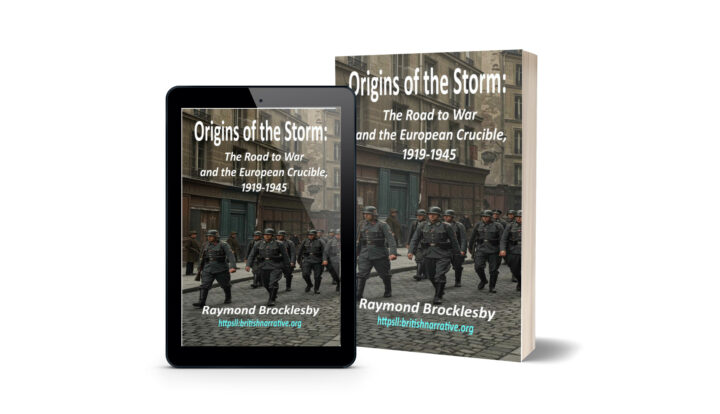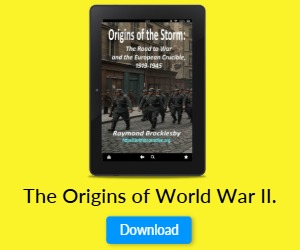Are We Doomed to Repeat the Darkest Chapters of History? This Book Urges Us to Understand Our Past to Protect Our Future.
In a world where the echoes of past conflicts seem to be growing louder by the day, a compelling new work by Raymond Brocklesby, “Origins of the Storm: The Road to War and the European Crucible, 1919-1945,” offers a vital journey into the heart of Europe’s most devastating period. If you’ve ever looked at current events and felt an unsettling sense of déjà vu, this meticulously researched volume, available through britishnarrative.org, is not just a history lesson—it’s an essential guide for our times.
Only $2.96 From Your Favourite Online Booksellers
BUY HERE – $2.95
Brocklesby’s work doesn’t simply recount the battles and political chess moves that defined the years between 1919 and 1945. Instead, it plunges into the crucial “why” and “how”: Why did the peace forged after the First World War crumble so disastrously? How did nations fall prey to destructive ideologies? And how did the world, still reeling from one global conflagration, allow an even greater one to ignite?
The narrative begins where it must, with the “bitter inheritance” of the Treaty of Versailles, exploring how its perceived injustices and humiliations in Germany created fertile ground for resentment and the rise of extremism. You’ll walk through the fragile “illusory calm” of the 1920s, understanding the economic undercurrents and political frailties that were pulling Europe towards disaster, long before the first shots of the Second World War were fired.
Brocklesby masterfully details the chilling ascent of dictators like Hitler and Mussolini, showing how they tested the waters with escalating aggression while the international community struggled to respond. The book provides a clear-eyed examination of the policy of appeasement, not as a simple failure, but as a complex response born from war-weariness, economic hardship, and a profound underestimation of the true nature of the threat.
As you journey through “Origins of the Storm,” you’ll witness the strategic blunders and moments of horrifying clarity, from the remilitarisation of the Rhineland and the tragedy of the Spanish Civil War to the fateful decisions made at Munich. The book meticulously charts the path to war, making it clear how each crisis, each concession, brought Europe closer to the abyss.
But this is more than just a prelude to conflict. The volume delves deep into “The European Crucible” itself, offering a comprehensive account of the war against Nazi Germany and its allies. From the Blitzkrieg that shattered Poland and crushed France, to Britain’s defiant stand in its “darkest hour,” and the monumental, brutal struggle on the Eastern Front unleashed by Operation Barbarossa, Brocklesby captures the sheer scale and ferocity of the conflict.
Crucially, the book does not shy away from the ideological monstrosity that drove the Nazi war machine. It provides an unflinching examination of the racial theories that formed the bedrock of Hitler’s worldview, leading to the “New Order” in Europe and the systematic horrors of the Holocaust. This exploration of how an advanced nation could descend into such barbarity is perhaps one of the most vital, and disturbing, parts of the narrative.
“Origins of the Storm” also navigates the shifting tides of war, detailing the pivotal battles like El Alamein and Stalingrad, the Allied landings in North Africa and Italy, and the relentless air war over Germany. You’ll follow the dramatic events of 1944, from the D-Day landings and the brutal slog through Normandy to the heroic and tragic Warsaw Uprising and the Soviet Juggernaut’s unstoppable advance from the East. The final, desperate gamble of the Battle of the Bulge and the eventual Götterdämmerung of the Third Reich are recounted with vivid detail, leading to the war’s devastating conclusion.
What makes this work particularly resonant today, as highlighted in its powerful foreword, is its insistence that this history is not a distant relic. The book serves as a “mirror reflecting uncomfortable truths” about the seductive allure of appeasement, the catastrophic consequences of unchecked ambition, and the fragility of peace when confronted by ideologies that glorify power. At a time when “the foundational principles of European security and stability are once again being challenged with a brazenness not witnessed for decades,” understanding the period from 1919 to 1945 is more critical than ever.
“Origins of the Storm: The Road to War and the European Crucible, 1919-1945” is more than just a history book. It’s an urgent call to remember, to understand, and to remain vigilant. It is a vital contribution to comprehending where we have come from, and more crucially, as Brocklesby puts it, “where we must never allow ourselves to return.”
If you seek to understand the forces that shaped the 20th century and continue to cast a long shadow over our 21st-century world, this compelling and comprehensive volume is essential reading.



